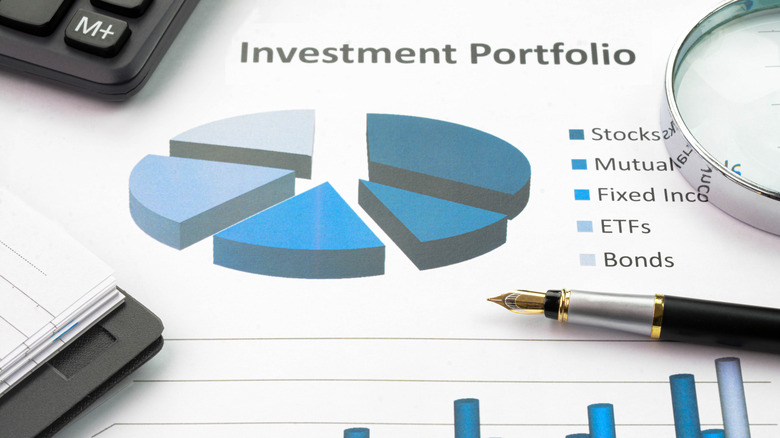Why Avoiding The Stock Market Is A Bad Retirement Move For Older Adults
As investors move closer to retirement age, there's a natural tendency to seek out a more conservative investing strategy. Perhaps most famously, there's the "age in bonds" rule which stipulates than your current age minus 100 equals the percentage of your portfolio that should be invested in the stock market. For example, a 40 year old should hold 60% stocks while a 60 year old is advised to invest just 40% in stocks.
Frequently, the "stocks" portion includes somewhat diversified and low-cost mutual funds, index funds, and ETFs. The remainder can be invested in bonds or similar fixed-income instruments like certificates of deposit. The logic behind transitioning to bonds near retirement is all about capital preservation. It's thought that as investors age, there's less time available to recover from stock market downturns, or even a market crash, before requiring access to those funds for living expenses.
While it's true that fixed income investments — except for rare defaults like Silicon Valley Bank — are all but guaranteed to return their promised yield, there's a price for stability. Investors must accept a much lower return than has historically been available from the stock market. Therefore, socking away too much money in bonds rather than stocks is a move that many older adults might come to regret.
Bond returns are inferior to stocks over long durations
According to the research firm Morningstar (as reported by CNN Money), "Since 1926, large stocks have returned an average of 10% per year; long-term government bonds have returned between 5% and 6%." As bad as that sounds for bond investors, conditions during the recent past are even worse. For instance, between 2013 and 2023, the 10-year treasury bond returned less than 1.5% on average.
Compounding the problem of low returns in fixed-income investments is the issue that many Americans have considerable catching up to do by retirement age. To wit, a survey by the American Association of Retired Persons (AARP) states that "20% of adults ages 50+ have no retirement savings, and more than half (61%) are worried they will not have enough money to support them in retirement." If you find yourself in one of these two camps, you may have to accept some stock market risk, and hopefully commensurate return, in order to meet recommended retirement goals.
For example, on the final trading day of 2022 (December 30), the S&P 500 index closed at 3,839.50. Exactly 24 months later on New Years Eve, 2024, that same index closed at a value of 5,881.63. That's better than a 53% gain in just two short years. It's also a painful reminder for older adults who didn't participate and failed to grow their nest egg by a similar amount. In rather painful contrast, the top yielding 24-month certificates of deposit available in December 2022 paid a paltry 4.30% APY.
Older investors are getting bolder
Diversification within your regular brokerage account or retirement account is a tried and true strategy. However, older investors are clearly becoming more daring as the rate of return between stocks and bonds is diverging. Per the Wall Street Journal, enrollees over the age of 55 in self-managed Vanguard 401(k) plans held more than 70% of their account value in stocks. That compares to just 38% in 2011. Furthermore, nearly 25% of Vanguard customers age 75 to 84 with regular (taxable) brokerage accounts are 100% invested in stocks.
To be sure, it's definitely possible to lose money in the stock market. As well, there's the ubiquitous investing disclaimer that "past performance is no guarantee of future results." That said, stock market corrections and even crashes have been relatively short-lasting in recent decades. For instance, stocks plummeted during the Great Recession of 2007 to 2009. Yet five years later, losses were not only recovered, but showed a small gain to boot. The market downturn at the beginning of the Covid-19 pandemic was even shorter; markets recovered in a scant six months following a 30% plunge.
Even older investors that will need access to their retirement account or taxable brokerage account sooner-than-later can likely afford to wait out a downturn of reasonable duration. And that's especially true if other sources of income like Social Security or a pension are available. In a nutshell, a mix of stocks and bonds or other fixed-income investments is still prudent for older investors, but you'll want to reconsider going overboard on the latter.


